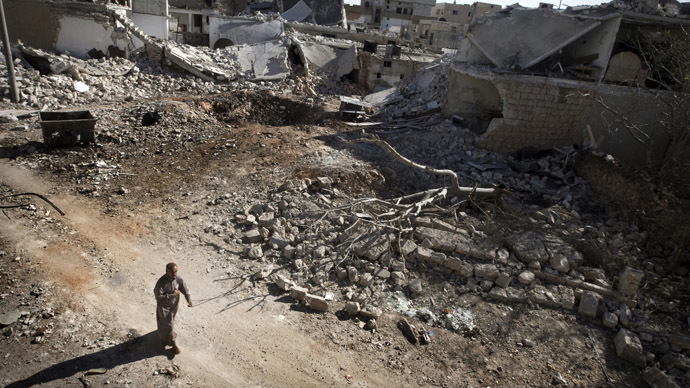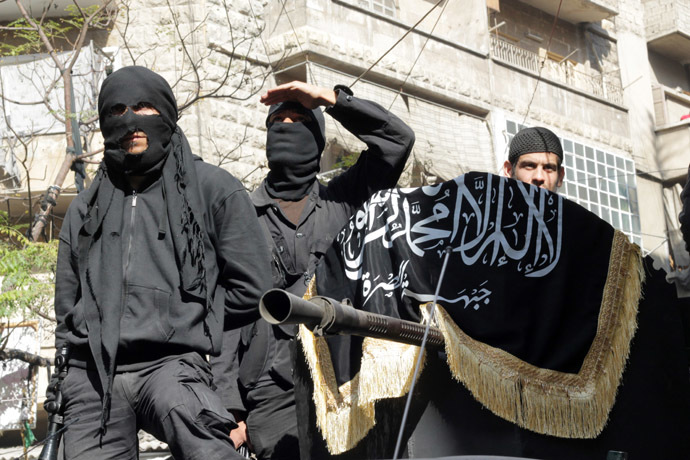Successful Syria peace talks possible only with no Western influence

Peace talks on Syria could have taken place in Geneva many times over the last year. However, money and vested interest in war from all sides prevented this, Patrick Henningsen, geopolitical analyst, told RT.
RT:France says it's skeptical about next month's peace talks with the moderate Syrian opposition. Plus the US and the UK have withdrawn their backing for the moderate rebels. What impact is this going to have on the more radical forces?
Patrick Henningsen: You have to look also at the recent statements by the Syrian opposition whereby they have reached out to the Syrian government to ask that there is a possibility in the future that the Syrian opposition rebels and the Free Syrian Army, Gen. [Salim] Idris, would need the help of the Syrian government to flush out the more radical jihadist elements in the battle field right now. This is very interesting because only a few months ago the supporters of the opposition and even the opposition itself were being very quiet, and many people were turning a blind eye to the existence of the significant radical jihadist Al-Qaeda linked elements running rampant, let’s say, in Syria. It served the interests at the time because the US, Britain and France were positioning themselves possibly for a military strike against the Syrian government over the alleged chemical weapons affair and everyone turned a blind eye to Jihadists. But now as military intervention did not happen, this is a totally different ball game now. Now in the long run this is actually the most significant danger to the future of the both sides. The opposition sees the danger here and obviously the Syrian government has seen it and said so from the onset. You really cannot discount what happened 3 months ago. In the run up to the war it would never have happened.
RT:Western officials are reportedly trying to hold talks with some of these radical groups. Is this an act of desperation?
PH: I think for Western groups or Western governments to be in talks with radical opposition in Syria that is comprised mostly of the foreign fighters, these imports, in many cases they are mercenaries. It is on record that some of the salaries of some of these foreign jihadists, hired guns are being paid by Saudi Arabian sources and from Qatari money as well. So if there is any Western government that wants to engage in a dialogue with these groups, this is the same as the Western governments saying ‘We don’t talk to terrorists, we don’t negotiate with terrorists’. Either be American or British or French government official: ‘We do not engage in dialogue with terrorists’.
Just a mere idea of wanting to include the radical Islamic elements into the conversation for the future of Syria is ridiculous. Just on the basis of the Western policy of the last 20-30 years, that doesn’t make any sense at all. It does though indicate that there is involvement by Western intelligences that do have links to some of these radical jihadist groups and that has been proven throughout history and is also the case today. I think you’ll be naïve if you think it wasn’t. So maybe it’s a possibility to try to bring them home, bring them in a little bit so that they can work with them a little bit closer and maybe try to minimize the influence in the new Syria. But the cats are already out of the bag as the imported Islamic army is there, and that has changed the complete playing field of that civil war in Syria.

RT:Jihadist forces appear to have hijacked the fight for regime change in Syria - so shouldn't they be the ones attending next month's international peace conference in Switzerland?
PH: There could have been a peace conference in Geneva many times over the last year and if I’m not mistaken the government has agreed to go on more than one occasion, and it was the opposition who decided not to engage in the peace talks. They are working with the encouragement of people from Washington, London and Paris to take that stance saying: ‘We will not speak to the Syrian government, we will not engage in any political diplomacy or dialogue with the Syrian government.’
They can’t really blame the Syrian government, but we have a lot of money being pumped into this war, it’s coming from all sides, arms are coming in as well, the CIA is on record admitting they are arming the opposition. They send them arms, but we don’t know exactly what they are sending. So you have these outside countries who are contributing to the civil war. You really can never get the clear picture from orthodox diplomatic stand points. It’s impossible.
The first thing that needs to happen for any peace talks to succeed is that the Western governments cannot be involved in any way, shape and form either through proxies or through the intelligence agencies or third parties with arming, financing, equipping, giving aid of any kind to the Syrian opposition because that distorts the picture usually. And it’s very difficult to track exactly what has been transferred and to whom and why as well. It really clouds the picture. This is one of the reasons why Syria is in the position it's in right now.
There are people who are arguing strictly on the regime change now. Those who wanted war back in September, from Britain, from the US, from France, are have now retracted from the military position and are now selling the idea of the regime change. This is the real problem here, not chemical weapons but regime change. So I think they lost the first round by trying to use the chemical weapons tactic to have some sort of intervention and regime change and now they are just going strictly for regime change. Clearly it has been a conscious policy shift and not only the rhetoric.
RT:Why have extremist rebel groups been so successful in edging out the more moderate opposition? Is it due to foreign backing?
PH: The one is a kind of neo-colonial motive for some of the traditional Western powers to want to direct, want to steer the destiny of Syria. The British have been involved in this region for a lot of time and the French also have former colonial assets, including Syria and Lebanon. They do have their motivations in terms of sphere influence, and, of course, Syria is a very, very important country strategically in the position between Israel, Iraq and Turkey. You cannot get a more strategically important country than Syria in the Middle East, but there are also tremendous natural gas reserves, some proven, some unproven, off the coast of Syria, Lebanon and Israel, also Iran and Cyprus. This is a hugely untapped region as far as natural gas is concerned. I think this is a factor for the Western long-term geopolitical strategy.
And also a potential pipeline that could one day be built between Iran going through Iraq, then Syria and going to the Mediterranean to supply European markets directly with natural gas from the gas fields shared by Iran and Qatar. That cannot be discounted.
The US, Britain and France are thinking 20 years ahead. This isn’t just about the chemical attack here, or a few thousand innocent civilians that have died; it’s not about that. That’s about long-term geopolitical and energy strategies of the traditional Western powers and corporations that run those particular countries, and also keeping the Chinese influence out of the picture in the long run.
The statements, views and opinions expressed in this column are solely those of the author and do not necessarily represent those of RT.
The statements, views and opinions expressed in this column are solely those of the author and do not necessarily represent those of RT.













